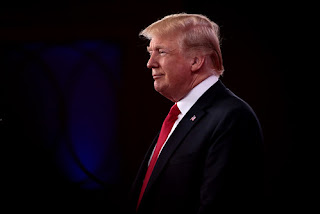Translating Trump – The nightmare of many professionals
Getting to translate the words of a world leader is probably the highest place a translator or interpreter can reach in terms of their career. But what if the leader in question seems to have a hard time staying politically and linguistically correct?
This is precisely what many translators around the world struggle with when faced with current US President Donald Trump. With his unique way of speaking (and tweeting!) Donald Trump has been at the heart of many interesting discussions in the field of translation – from online jokes and light broadcasts on television, to actual academic essays and studies on the subject.
As students of translation, let’s consider this case as an opportunity to question the role of political translation.
Why Trump’s speech?
- Linguistical problems
Leaving any political concerns aside – it is usually agreed that President Trump’s use of grammar and his lexical choices could be better to say the least. As an example, The Carnegie Mellon University Language Technologies Institute (LTI) revealed after analysis in 2016 that Trump’s lexical complexity was the poorest among his rivals during the last elections and among past US presidents.
- Lack of logic
The biggest problem encountered with Trump seems to be that what he says simply does not always make sense. He often contradicts himself or goes on to talk about something completely different that translators do not always know about. This is especially a problem for simultaneous interpreters who need to maintain a firm grasp of the speech being interpreted at all times.
- Ethics
Trump is very famous for his controversial and offensive comments. And the truth is, many translators do not agree with his view on things, which makes it difficult to get into his head – something that usually helps translation. Such work can also become very emotional and frustrating as one repeats statements without being able to express judgment about what is right and wrong.
The real debate: to stay or not to stay authentic
Is it tolerable to alter the way a person speaks through translation? Many professionals believe that it is the duty of translators to stay as authentic as possible by transcribing things just as they are, but the reality of political translation is not always that straightforward.
- Credibility as a translator
If the translator was to stay 100% faithful to originally poor content, wouldn’t people question the translator’s command of their language? In Russia, translators have chosen to make Trump sound more “adult and smart”, and more “like Putin” in Russian. This brings a question: does it matter that non-English-speaking countries may be perceiving a polished and refined version of Trump as a result of translation?
International relations are not simple – a small quarrel among two countries’ leaders could lead to terrible outcomes for everyone. In this context, it wouldn’t be surprising that translators use special caution with Trump’s particularly daring way of approaching things. The problem is: is it the role of the translator to tamper with someone’s words were they to possibly cause trouble if transmitted just as they are?
- Cultural differences
While a meeting between two long lost friends might involve hugs and kisses in France, it might just involve a warm but distant smile in Japan and still be of the same emotional level. Similarly, a translator might choose to smooth out the angles of Trump’s provocative approach so that the message can still be understood on the same level in the target language without being blurred by what could be considered insignificant cultural differences.
What can you do as a translation student?
You heard it - Trump represents a real challenge to translation professionals, and he probably isn’t the only one out there. Here are some tips to prepare yourself if you have to translate someone like him in the future:
➔ Think about your stance on the questions of authenticity above so you don’t have to decide during the actual job.
➔ Study the person you will translate and prepare accordingly so you can anticipate better.
➔ Keep practicing and become a master of the subtleties of your working languages so you have a better chance of smoothly getting around tricky situations.
➔ Remember that translators are humans who also make mistakes, like that time a Japanese translator mistook the name of a race horse for Trump’ secretary. In other words: you will be fine.
Written by Florence M.
-------
This article is based on information from the following articles:





Thank you for such a thought-provoking article
RépondreSupprimerAccording to a study by the University of Carnegie Mellon (Pittsburgh, Pennsylvania), which compared the ability to speak to all US presidents, since the most literate US president, Abraham Lincoln, the language level of American leaders has steadily deteriorated. Why this is happening nowadays – that is still an open question.
Do you think that in such situation the interpreter is taking the negociations in his own hands? Does he have the right to conduct negotiations?
Really? I didn't know about this study! It would be interesting to explore the reasons why and see if this is a trend that can be observed in other countries.
SupprimerTo answer your question: No, I personally do not believe the interpreter can take the negotiations in his or her own hands, but I definitely think he or she might be able to influence them to a certain extent.
Florence M.
Thank you for your article! I never realized how difficult it must be for translators to translate Trump! I am also surprised that Russian translators chose to change the perception of Trump in a better way. I don't think it is professionnal because a translator is not supposed to change the words of someone to such an extend that the audience will perceive this person differently. And, in doing so, they can also affect the judgement people will have about Trump. I wonder if this manner of translating Trump has also occured in other countries, do you have information in this regard?
RépondreSupprimerClara M.
Thank you for your comment, Clara! I did indeed gather similar information about other countries without mentioning it, since the article would have been endless... But it seems to be a common trend across the world.
SupprimerFor example, according to the article from The Guardian posted in my bibliography, some translators in India use retellings of ancient Hindu epics to express Trump's "grandiosity" when speaking. One Indian translator even says that "In English, Trump may not sound very intelligent, but when you translate him with context in Hindi, it makes him sound much better than he is". I was also very surprised to learn about all this!
Florence M.